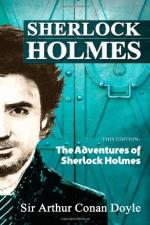“What of the rat, then?”
Sherlock Holmes took a folded paper from his pocket and flattened it out on the table. “This is a map of the Colony of Victoria,” he said. “I wired to Bristol for it last night.” He put his hand over part of the map. “What do you read?”
“Arat,” I read.
“And now?” He raised his hand.
“Ballarat.”
“Quite so. That was the word the man uttered, and of which his son only caught the last two syllables. He was trying to utter the name of his murderer. So and so, of Ballarat.”
“It is wonderful!” I exclaimed.
“It is obvious. And now, you see, I had narrowed the field down considerably. The possession of a grey garment was a third point which, granting the son’s statement to be correct, was a certainty. We have come now out of mere vagueness to the definite conception of an Australian from Ballarat with a grey cloak.”
“Certainly.”
“And one who was at home in the district, for the pool can only be approached by the farm or by the estate, where strangers could hardly wander.”
“Quite so.”
“Then comes our expedition of to-day. By an examination of the ground I gained the trifling details which I gave to that imbecile Lestrade, as to the personality of the criminal.”
“But how did you gain them?”
“You know my method. It is founded upon the observation of trifles.”
“His height I know that you might roughly judge from the length of his stride. His boots, too, might be told from their traces.”
“Yes, they were peculiar boots.”
“But his lameness?”
“The impression of his right foot was always less distinct than his left. He put less weight upon it. Why? Because he limped—he was lame.”
“But his left-handedness.”
“You were yourself struck by the nature of the injury as recorded by the surgeon at the inquest. The blow was struck from immediately behind, and yet was upon the left side. Now, how can that be unless it were by a left-handed man? He had stood behind that tree during the interview between the father and son. He had even smoked there. I found the ash of a cigar, which my special knowledge of tobacco ashes enables me to pronounce as an Indian cigar. I have, as you know, devoted some attention to this, and written a little monograph on the ashes of 140 different varieties of pipe, cigar, and cigarette tobacco. Having found the ash, I then looked round and discovered the stump among the moss where he had tossed it. It was an Indian cigar, of the variety which are rolled in Rotterdam.”
“And the cigar-holder?”
“I could see that the end had not been in his mouth. Therefore he used a holder. The tip had been cut off, not bitten off, but the cut was not a clean one, so I deduced a blunt pen-knife.”
“Holmes,” I said, “you have drawn a net round this man from which he cannot escape, and you have saved an innocent human life as truly as if you had cut the cord which was hanging him. I see the direction in which all this points. The culprit is—”




